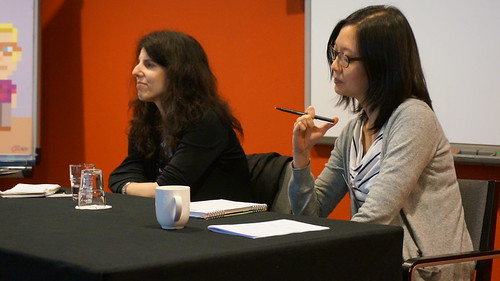I had the joy of attending the
Quantified Self Europe 2014 in Amsterdam. It was amazing and I feel kind of gutted its over so quick.
Its amazing to think it was only a year since we talked about sharing data and the joy of data at the Quantified Self Europe 2013. In the year between the two a lot has happened, especially when Edward Snowdon revealed to the world that we were being hoodwinked into something not even George Orwell could make up.
The big unofficial theme of the conference was about data privacy and security. To be honest I’ve been loosely calling it data ethics, which hopefully will make sense in the near future. During the opening of the conference, Gary and Ernesto made a point of talking about photoblogging/lifeblogging and made reference to last years session about lifeblogging. It was common sense but good to be clear right from the top.

The amount of devices like Google Glass, Autographers and Narrative Clip was interesting in its self. Number-wise, I spotted 5 Google Glasses, 4 Autographers (including myself) and about 30+ Narrative clips. The narrative clip was certainly everywhere and with no status, you have no idea if it was on, off or taking a picture right then. I wore the Autographer and the pictures have been useful to remind myself of things and people I spoke to. I will admit I did leave it on by accident when in the loo but nothing was captured (ooer! lets leave at that)

The QS guys, asked their keynote speakers to talk without slides and the talks were passionate and engaging. Dana Greenfield and Kaiton Williams talks were well worth listening to again. Dana’s talk about grief was personal and really seemed to divide people. I heard someone say it was soooo personal they felt a little uncomfortable. Which I said is a good thing and unique to QSEU. Kaiton talked about self image and posed the question, what happens when being healthy is no longer about not being sick? He’s point was the conflict between business models and self image. What we do now, will effect the future as QS races to the mainstream.
The Conference is structured like a Unconference with filled in slots. At some points there is up to 20 things happening at once. I decided to avoid the eHealth type talks and applications, because they wouldn’t be much use to work and its already quite developed an area.
Here’s my other highlights

Data Futures: Possibilities and Dreams by Alberto Frigo
This discussion was about data reuse beyond the 5-10 years. What happens to our data, where does it just get stored? Does it get deleted? What is the weight of this data? Ethics were in effect again, and interestingly this was right before the EU rule came in about removing links from Google. Kaiton was in the room and said a bunch of interesting things but it was interesting to hear spooky consequences of automated systems. Like someone getting a request to send birthday greetings to someone who had died 5 years previously. This sounds kind of crazy but its going to happen more and more.
Personal data: Attack & Defence by Magnus Kalkuhl and Kley Reynolds.
This two part session started more like a workshop but found its feet in part 2, when Kley ran through a European project (which I’m still trying to get the details for) it turns your quantified state into a finger print securing your devices using a PAN model. This really fascinating for a number of reasons including if it was stolen, only person who could use it would be you or a thief who spend weeks emulating you. At some point Kley mentioned how it could hook into BitCoin but by that point my head was blown already.
Kley also later when talking, said how much he liked the idea of Perceptive Media. He offered up a scenario involving a live view of your house being monitored by an external person like you can do with taskrabbit. You don’t want to necessarily tell that person where your house is, so you change aspects of your home so its not clear where it is or even what time it is. Its very much like Ghost in the Shell’s ghost hacker, the laughing man…
The Laughing Man is an expert hacker, able to hide his physical presence by editing himself out of video feeds and cybernetic eyes, concealing his identity by superimposing an animated logo over his face, and hijacking cybernetic brains altogether, all in real-time
Basically your able to manipulate the video feed in real time. If you want to see basic evidence of this, check out diminished reality. It can be simple things like change the angle of the camera, removing certain objects, changing a dog into a cat for example but these little things all add up to the person watching not quite sure when they decide to come and rob the place. Thanks for that Kley and I certainly look forward to hearing more about the project because damm it could be a disruptive.
It was interesting to hear the term lifejacking in the context of hacking quantified self data. Actually even I was slightly worried…

Is Open Privacy the Next Open Source? by Laurie Frick
Another good conversation resulting in lots of viewpoints including the viewpoint shared with John Wilbanks. Very interesting in the light of the health health caredata upset recently in the UK.
One of the things I never really considered in so much is the linked-data. When I was running BBC Backstage, linked data was a pleasure and joy. The ability to link data to make new and interesting insights was mind blowing. Mashup and create new insight was great but with personal data the insight takes on a much more scary and much more sinister tone.

The other aspect is the amount of insight you can tell over time. A small subset of data can tell you little but a year or more of location data can tell you loads more than you may really want to consider. This was further backed up in the session, Passive Sensing on Smart Phones with Jan Peter Larsen and Freek van Polen. Passive sensing or as I prefer implicit data is the next battle ground.

It was a pleasure to meet PBS’s Sesame Street innovations team too, further proving the quantified self is grow for the betterment of all plus they seem to be trying to archive a similar goal to our project.

Its aggregation which was the other big trend trend I noticed at QSEU14. Everyone had their own aggregation dashboard to collect your data and make insights. Pryv looked pretty good with a ton of useful clearances and the ability to store exactly which country your data sits. There were even companies offering to make insight of your data for you, bypassing the inputing data part. Even Intel had their own in beta service. I have been a fan of Fluxstream because its the most developed open source dashboard I’ve seen to date. There are many others but I don’t feel confident recommending or using something closed source to store my private data.

I actually had the pleasure of meeting the people behind the fluxstream project and I was very impressed with her ignite talk which highlighted and answered a lot of the issues I had with it. Main one being unambiguous timestamps and a better API. Afterward my talk at the end of the day, we caught up and we discussed how they Flux could work with Trakt.TV, something I’d like to have, as part of a very early Quantified Self project in R&D. Its worth mentioning the project in part but I’d rather do that officially on the R&D blog, although you can get a sniff of the presentation here. Its low on details because its mainly about my own consumption and its auto advancing slides, which I hate so much!

There was touching finish to the proceedings with a public mention about the work of Seth Roberts (who recently died). Its fitting to end with his moto… The Best Way to Learn is to Do. This sums up the Quantified Self movement more than you can imagine. Even when I finished my presentation, Ernesto asked me the question of what I personally got out of the insight into my own media consumption. We might be the edge cases and even deeply curiosity but as Kaiton said, we will define what the rest of the world does in the near future…

It was an exciting event and I’m very glad I could participate in a small way. It didn’t quite have the buzz of the 2013’s QS Europe but I think its because the diversity of the subjects was so wide, while this year it was much more concrete around the subjects mentioned before. I’ll look forward to telling more on the R&D Blog and going into more depth in internal talks and in the QS Manchester meetup on the 6th June.
Thanks to everyone who took part and made it a great event… Look forward to seeing you all in 2015?
































